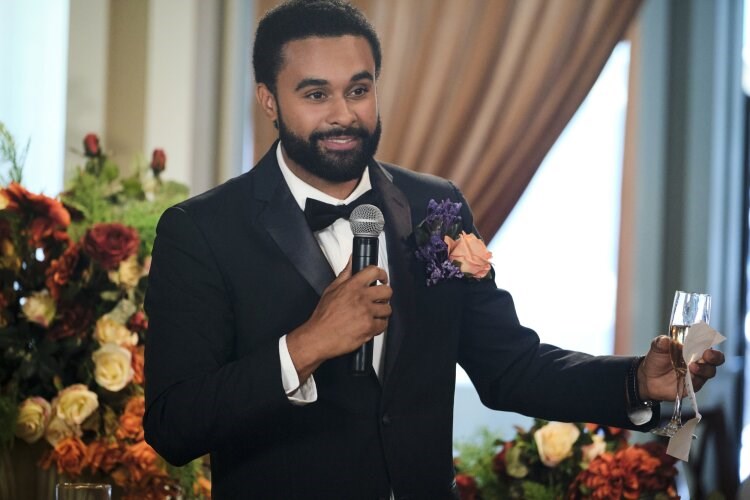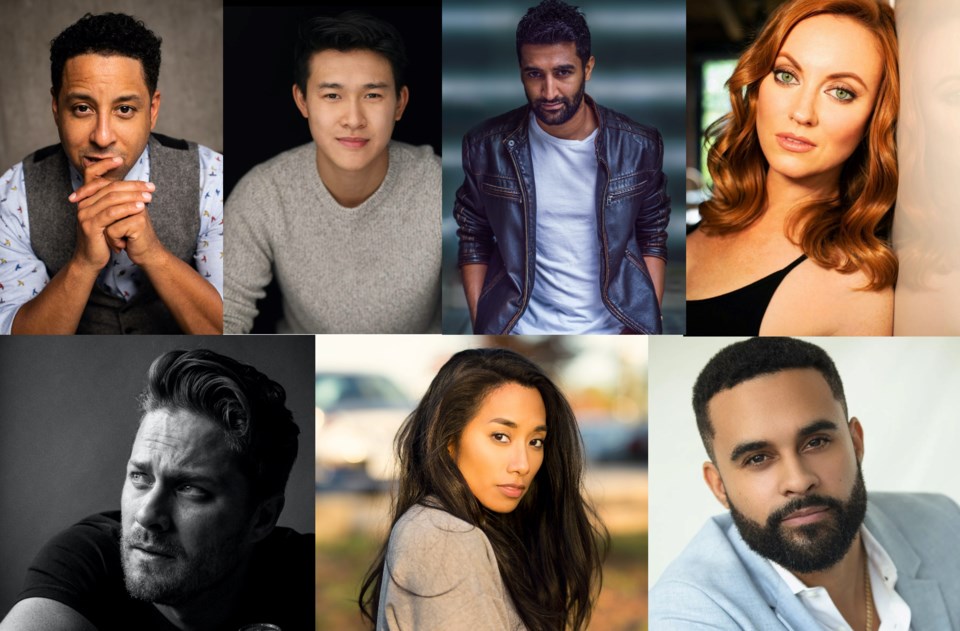The world has seen a massive shift in media over the last 10 years. Stories and perspectives that were historically marginalized or repressed on screen have been receiving their due in film and on television - exponentially so since the pandemic.
The Hallmark universe, known for its wholesome love stories and Christmassy content has not been immune to these changes. The historically white, Christian-run network has received criticism over its lack of diversity, but in the last two years has made strides to address the concerns. Their storylines remain wholesome but the network has started to make room for people of colour and queer representation. One of the first-ever Hallmark Christmas movies to feature a gay couple was filmed on Â鶹´«Ã½Ó³»Island last year starring Mean Girls actor Jonathan Bennett.
These four Â鶹´«Ã½Ó³»actors have all recently starred in Hallmark films that are reflective of these improvements to the network and as part of a new series called 'Meet the Hallmarkies,' they weigh in on Hallmark's increasing diversity and share their personal thoughts on playing best friends versus leading roles.
Antonio Cayonne (Christmas in Evergreen: Bells are Ringing, The Vows We Keep, Matching Hearts)
"Frankly, even before I was involved the wheels were set in motion, just by virtue of like [Yellowjackets actor] Rukiya Bernard being a part of that world and Holly Robinson Peete being a part of that world. But handing over sort of a major love interest story to myself and Rukiya and Holly and Colin Lawrence [as part of the Christmas in Evergreen series] really centred an experience that up until that point was a little bit non-Hallmark.
That's not to say that prior to us, there had been nothing. It's not that. But prior to us, it kind of felt like pebbles in the pond. [Characters played by people of colour were] always the best friends. I think it's also important to invert that dynamic. And so Christmas in Evergreen was one of the first really prominent times that they took a chance on a big series.
So like I said, it was not so much that it was the first but it was certainly notable, it was unmissable. And it just so happened to be at a time when we know in America the conversation was shifting. People were waking up to a way of speaking about something, to a need to speak about something, and kind of bravery around it. And I think that the network showed a little bit of bravery as well, in choosing to expand who their leads were in large movies that they were producing and that they were putting their name and their efforts behind.
And that kind of carried on throughout the season now. Has it carried on past that season? I don't know. But at the very least for that locked period of time, optically there were a lot of changes happening. And I think that they were very important because it sort of signalled something to the fan base."
Adil Zaidi (The Perfect Recipe/Welcome to Mama's, A Christmas Together with You, My Best Friend's Bouquet)
"It's been interesting, it's been really fun trying to jump into a network that is notoriously in the public eye and has been known to be not incredibly diverse. It's been fun to be a part of the group that gets to push the boundaries on that front."
Cardi Wong (Christmas for Keeps, My Best Friend's Bouquet, Always and Forever Christmas)
"I think my role in this has been to show that it's possible for Asian—I'm going to speak specifically about Chinese men—but it's possible for these Chinese men to be in these roles where they can have a love interest, or they can be the dad, or a leading man, essentially.
It took me a long time personally to even feel comfortable auditioning for these things. Auditioning for roles where I'm the love interest or I'm like flirting with the girl because I grew up getting by on my quirky humour and just being off beat. I guess that's also part of just growing up for myself and maturing to where I am and who I am.
I'm not entirely sure but I must be one of the first Asian men to be featured on a poster for Road to Christmas. So it feels like a lot of pressure to make sure you do a good job. But then it also feels like I'm ready to do that good job."

Donna Benedicto (Matching Hearts, Jingle Bell Bride, Sweet Carolina)
"Another amazing thing about being in Hallmark movies is that they have the most awesome, sweetest, supportive fandom in the world. Like all my fans are the absolute sweetest. And so what ended up happening was, there was a couple Hallmark fans that were watching some of my work and they started tweeting the Hallmark network saying they wanted me to be a lead. I don't know if that had anything to do with them me getting the leads or not but it was really, really sweet.
And when I booked that first lead I was so excited, not just like for me but for all the people who supported me because, most of the people that follow me on social media know, I'm all about representation. And that's the main reason why I do this, not just because I love it, but because I never got to see myself represented growing up. And I just want all my nieces and nephews and all the little Filipino girls or dark-skinned Asian girls to just feel to see themselves on TV and think that they could be heroes too.
During the pandemic, after the BLM movement happened, there was a lot of people who call it out the Hallmark network for not being diverse enough. And the thing is, I came to their defense from my experience just because they're the only network that gave me screen time, like actual screen time. And some of the movies that I was in were quite diverse. They have so many movies across the board so if you see all the ones that aren't diverse that's what you're gonna think is happening. But when it comes from my point of view, they did so much for me and Filipino representation. Obviously, every network could do better. It's 2022 and we're still fighting a good fight here. But for what they did for me I'm really grateful."
Nathan Witte (My Best Friend's Bouquet, A Christmas Treasure, Sealed with a Kiss)
"My Best Friend's Bouquet was my first lead in a Hallmark and that was pretty much the onset that I started seeing change. The fact that I was hired to play a number two with an ethnic background and have a beard was night and day.
Before that time I would never ever really expected for me to get to that position in that regard. There was this narrative before the shift happened that no actor on any Hallmark set could have a beard. It was just a thing they decided, and everybody was clean-shaven, men just didn't have beards. So every time I was on a Hallmark set up until that point, from a five o'clock shadow right up to anything to close a beard was vetoed, and shaved on set. So that was a drastic change and I was blown away by that.
And then of course, there was the narrative of what happened in the the world of advertisement, when the CEO had to step down and then a new CEO stepped in. I don't know too much of the details of what and why and how, but there definitely was a shift when a new CEO came in. I guess it has to start at some point, and it has to start with someone. It's an odd place and kind of a weird place to be because I almost feel like being cast as a lead in a Hallmark at the time I was, was not only just being at the right place at the right time, and of course, the level of skill that I have, but also the fact that there was Black Lives Matter going on. And then also COVID was happening. I can't really pinpoint whether, you know, one was more or the other."
But during COVID, for Canadians in general, a lot of opportunities were brought to them that weren't necessarily available before, because they weren't allowing many Americans up.
I definitely noticed that there's been a shift and change in the last few years. And I'm all for it. Because I think it's a little naive to think that there's just one small network of people in the United States that are looking for wholesome, quality content. And I think that stretches to any demographic of people. I think we all just want to be happy and enjoy and have a heartfelt story. So now that they're allowing different cultures and ethnicities and even different sexual preferences, I think that's great for those demographics.
People might get upset, but you don't have to watch it. They're still making content for those other areas, it's not like they stopped making wholesome Christian content for that demographic, they're still doing that. But now they're just opening it up and I think that's how you grow not only as a company but also as an individual. And so I think the company will do great things in the future and stick around because they're willing to shift and change."

